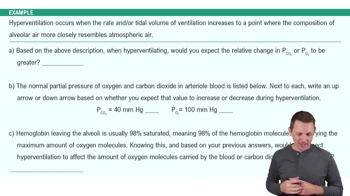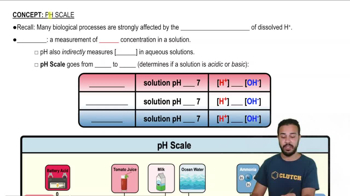Here are the essential concepts you must grasp in order to answer the question correctly.
Hyperventilation
Hyperventilation is a condition characterized by an increased rate and depth of breathing, leading to excessive expulsion of carbon dioxide (CO2) from the body. This can occur due to anxiety, stress, or medical conditions, and it often results in symptoms such as lightheadedness, tingling in the extremities, and shortness of breath.
Recommended video:
Carbon Dioxide Retention vs. Expulsion
During hyperventilation, the body expels more carbon dioxide than usual, leading to a decrease in CO2 levels in the blood. This contrasts with normal breathing, where CO2 is retained to maintain homeostasis. Understanding this process is crucial for recognizing the physiological effects of hyperventilation on the body.
Recommended video:
Blood pH and Respiratory Regulation
Hyperventilation affects blood pH by causing respiratory alkalosis, a condition where the blood becomes more alkaline due to decreased carbon dioxide levels. CO2 is a component of carbonic acid in the blood, and its reduction leads to a rise in pH. This shift can have significant physiological implications, including altered oxygen delivery to tissues.
Recommended video:




